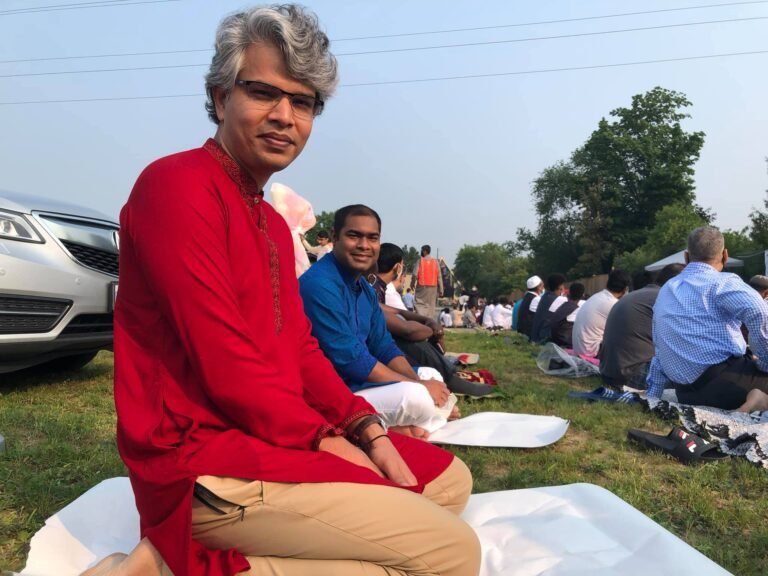
- June 6, 2019 -
Diversity & Inclusion
Celebrating Eid-ul-Fitr
By Firoze Alam

Share in
From June 4 to June 5, Muslims across Canada celebrated Eid-ul-Fitr. Practicing Muslims fast every day from sunrise to sunset for one month that ends with the celebration of Eid-ul-Fitr. Depending on your geo-location and when Ramadan begins (Ramadan is dependent on the lunar calendar), you could fast between 11 hours (Argentina) to 21 hours (Murmansk of Russia). In other words, this year, fasting Muslims in Russia did not even drink water for 21 hours every day.
I was born in a Muslim family in a small village in Bangladesh. Fasting is obligatory for all healthy Muslims from the age of 12. I have vivid memories of fasting during summer days as a teenager, especially when I had to walk almost 10 kilometres every day to attend school. I have worked as a high school guidance counsellor at a Bangladeshi community school in Saudi Arabia, where I worked with fasting teenagers. It is not easy for teenagers to fast when their body growing fast, and the need for nutrition is critical for the mental work of academia. I know stories of many Bangladeshi construction workers fainting while labouring under the unforgiving desert sun, yet they denied to break their fast.
I invite the readers to pause for a minute and reflect on the significance of Ramadan for Muslims for two interconnected reasons. First, we humans are storytelling beings. World-renowned historian Harrari argues that humans, in their 2.5 million years of evolution, have ascended over other stronger animal by collaborating with each other. Our shared stories enable us to define who we are and collaborate with those who also share “our stories.” Second, if collaboration is a quintessential element of remaining competitive in an industry that is disruptive in nature (such as the tech industry), and you have a (or many) Muslim colleague(s), it is perhaps critical for you to know their stories that define their sense of self for better collaboration.
I can say with some confidence, at least in the North American context, your Muslim colleagues perhaps know more about Christmas than you know about Ramadan or Eid-ul-Fitr. I will argue that this is an opportunity to put on your diversity and inclusion hat and find ways to make your workplace more inclusive by encouraging empathy, education, respect and understanding.
You might say (and rightfully so), “We have policies for allowing religious holidays.” I am sure your colleagues of different faith sincerely appreciate it. I believe if you knew what Ramadan and Eid-ul-Fitr meant to your Muslim colleagues, you would be able to be respectful towards them in your acts and words for the entire month and create many moments of belonging for them. For instance, if you would avoid eating and drinking during meetings with your Muslim colleagues who are fasting and also love the food you are enjoying; this could be an act of respecting their faith. You are not required to do so, but this could be a way to earn their trust because you respect their story, contributing to many subsequent successful collaborations.
In his book Behave, Stanford professor and neurobiologist Robert Sapolsky showed that we humans have evolved to think in terms of “us- versus-them.” It is our shared stories that create the boundary between “us” and “them.” Professor Sapolsky also gives examples of extraordinary events in human history that shows this boundary is malleable, such as the Christmas Truce during the First World War, which brought soldiers from both ends together to exchange gifts and celebrate Christmas because they had a shared story: their Christmas. I believe, if you take an active interest in learning the stories of your colleagues, miracles can happen!
ABOUT THE AUTHOR
Firoze Alam
Lorem ipsum dolor sit amet, consectetur adipiscing elit, sed do eiusmod tempor incididunt ut labore et dolore magna aliqua. Ut enim ad minim veniam, quis nostrud exercitation ullamco laboris nisi ut aliquip ex ea commodo consequat. Duis aute irure dolor in reprehenderit in voluptate velit esse cillum dolore eu fugiat nulla pariatur. Excepteur sint occaecat cupidatat non proident, sunt in culpa qui officia deserunt mollit anim id est laborum.